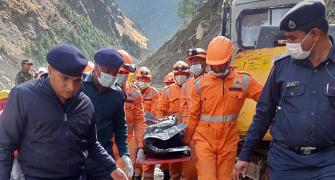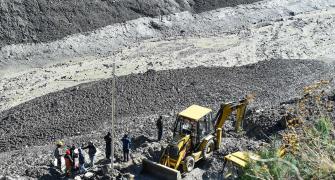Rescue teams on Saturday began widening a hole drilled into an approach tunnel on the way to the possible location of over 30 people trapped inside a sludge-choked tunnel of the NTPC's Tapovan-Vishnugad hydel project after a flash flood ravaged the area on Sunday.

"We are working under a three-pronged strategy to reach to those trapped in the tunnel. The hole we drilled yesterday is being widened to one feet so as to reach a camera and a pipe inside the silt flushing tunnel where the trapped are said to be located, said General Manager of the NTPC project, R P Ahirwal.
A hole with a diameter of one feet will help send in a camera to ascertain their location and a pipe to flush out accumulated water from the tunnel, Ahirwal said.
The other two parts of the strategy are clearing the desilting basin of the NTPC barrage through which muck is constantly flowing into the tunnels and restoring the flow of the Dhauliganga to the right which has tilted to the left after the flash flood hampering the sludge clearing operation, he said.
Describing the rescue of people as a priority, he said the NTPC has put more than 100 of its scientists on the job.
When asked whether an attempt could also be made to send rescue personnel to the possible location of those trapped inside the tunnel through the hole, the GM said it will need to be widened further for that and will be done if the need arises.
"More than 100 of our scientists are on the job. They are devising strategies and having them implemented," Ahirwal said.
He said all resources and mechanical equipment required for the operations are available at the project site.
However, citing the conditions inside the tunnel, he said, "We can operate only with a few machines at a time. Rest of them have to be kept on standby because our strategy is to keep the operations underway round the clock."
If for some reason the equipment stops working, there are alternatives on the standby to ensure that the operations do not stop, he said.
He said many experienced workers of the project went missing in the calamity and those put on the job are new people but still they are working with total dedication.
Talking about the biggest challenge being faced by the rescue team, the NTPC official said, "The rescue personnel are going to the tunnel where the men are likely to be trapped via HCC Adit where muck is constantly coming down from the NTPC barrage and its desilting basin to hamper the rescue efforts. The water of Dhauliganga too is coming into our tunnels through the desilting basin as it has tilted to the left after the avalanche."
"Hence, restoring the flow of the Dhauliganga to the right is a big part of our strategy," Ahirwar said. The sludge choked contours and conduits of the barrage's desilting basin can also be removed more effectively only if the flow is restored back to its earlier position.
The work on restoring the flow of Dhauliganga has begun already with the help of heavy machines, he said. So far, 38 bodies have been recovered from the affected areas while 166 are still missing.
DIG Nilesh Anand Bharne said 11 of the dead have been identified. Eighteen body parts had also been recovered from the flood-hit areas, of which 10 have been cremated after taking their DNA samples so far, he said.
The State Emergency Operation Centre here said scientists of the Indian Institute of Remote Sensing during an aerial survey of the Rishiganga found that the glacial lake formed due to the avalanche over it has begun to release water which reduces chances of its breaching or causing a fresh flash flood.
The lake which has formed over the Rishiganga after the flashflood had increased the concern of experts on Friday.









